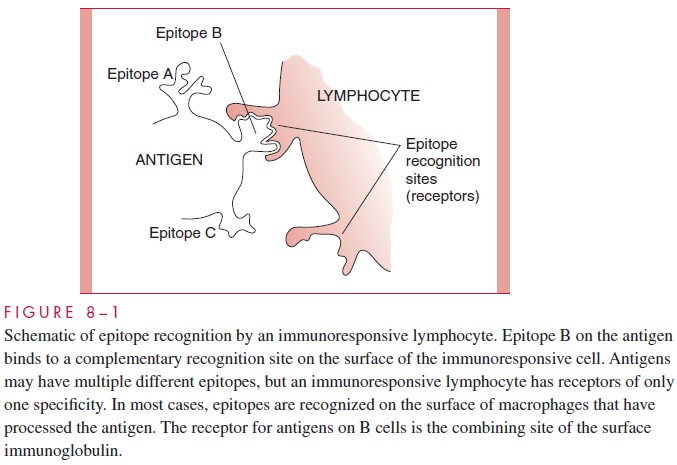Chapter: Medical Microbiology: An Introduction to Infectious Diseases: Immune Response to Infection
Antigens and Epitopes
ANTIGENS AND EPITOPES
An antigen is a substance (usually foreign) that reacts with antibody and may stimulate an immune response when presented in an effective fashion. A large structure such as a protein, virus, or bacterium contains many subregions that are the actual antigenic deter-minants, or epitopes. These epitopes can consist of peptides, carbohydrates, or particular lipids of the correct size and three-dimensional configuration to fill the combining site of an antibody molecule or a T-cell receptor (Fig 8 – 1). Approximately six amino acids or monosaccharide units provide a correctly sized epitope. Much of our knowledge of the combining sites of antibodies and their specificities was determined by immunizing ani-mals experimentally with small organic molecules called haptens. Some of the best ex-amples of these are substituted phenols, such as 2,4-dinitrophenol, which themselves do not induce the production of antibodies but must be coupled to a carrier molecule to be immunogenic. The term immunogen is a synonym for antigen, but it is sometimes re-stricted to those antigens able to elicit an immune response as distinguished from the abil-ity to react only with antibodies and with T-cell receptors.

A foreign antigen entering a human host may by chance encounter a B cell whose surface antibody is able to bind it. This interaction stimulates the B cell to multiply, dif-ferentiate, and produce more surface and soluble antibody of the same specificity. Even-tually, the process leads to production of enough antibody to bind more of the antigen. This mechanism is most likely to operate with antigens such as polysaccharides that have repeating subunits, thus improving the chance that exposed epitopes are recognized.
Large, complex antigens such as proteins and viruses must be processed before their epitopes can be effectively recognized by the immune system. This processing takes place in macrophages or specialized epithelial cells found in the skin and lymphoid organs, where they are adjacent to other immunoresponsive cells. The ingested antigen is de-graded to peptides of 10 to 20 amino acids that are presented by major histocompatibility (MHC) products on the host cell surface to be recognized by T cells.
Related Topics